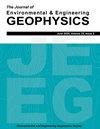Permafrost Mapping with Electrical Resistivity Tomography: A Case Study in Two Wetland Systems in Interior Alaska
IF 0.7
4区 工程技术
Q4 ENGINEERING, GEOLOGICAL
引用次数: 3
Abstract
Surface-based 2D electrical resistivity tomography (ERT) surveys were used to characterize permafrost distribution at wetland sites on the alluvial plain north of the Tanana River, 20 km southwest of Fairbanks, Alaska, in June and September 2014. The sites were part of an ecologically-sensitive research area characterizing biogeochemical response of this region to warming and permafrost thaw, and the site contained landscape features characteristic of interior Alaska, including thermokarst bog, forested permafrost plateau, and a rich fen. The results show how vegetation reflects shallow (0–10 m depth) permafrost distribution. Additionally, we saw shallow (0–3 m depth) low resistivity areas in forested permafrost plateau potentially indicating the presence of increased unfrozen water content as a precursor to ground instability and thaw. Time-lapse study from June to September suggested a depth of seasonal influence extending several meters below the active layer, potentially as a result of changes in unfrozen water content. A comparison of several electrode geometries (dipole-dipole, extended dipole-dipole, Wenner-Schlumberger) showed that for depths of interest to our study (0–10 m) results were similar, but data acquisition time with dipole-dipole was the shortest, making it our preferred geometry. The results show the utility of ERT surveys to characterize permafrost distribution at these sites, and how vegetation reflects shallow permafrost distribution. These results are valuable information for ecologically sensitive areas where ground-truthing can cause excessive disturbance. ERT data can be used to characterize the exact subsurface geometry of permafrost such that over time an understanding of changing permafrost conditions can be made in great detail. Characterizing the depth of thaw and thermal influence from the surface in these areas also provides important information as an indication of the depth to which carbon storage and microbially-mediated carbon processing may be affected.用电阻率层析成像绘制永久冻土:阿拉斯加内陆两个湿地系统的案例研究
2014年6月和9月,在阿拉斯加费尔班克斯(Fairbanks)西南20公里处的Tanana河以北冲积平原上,利用基于地面的二维电阻率层析成像(ERT)调查来表征湿地遗址的永久冻土分布。这些地点是一个生态敏感研究区域的一部分,该研究区域表征了该地区对变暖和永久冻土融化的生物地球化学响应,该地点包含阿拉斯加内陆的景观特征,包括热岩溶沼泽、森林冻土高原和丰富的沼泽。结果显示植被如何反映浅层(0-10 m深度)永久冻土分布。此外,我们在森林覆盖的永久冻土高原上看到了浅层(0-3米深)低电阻率区域,这可能表明未冻水含量的增加是地面不稳定和解冻的前兆。从6月到9月的延时研究表明,季节性影响的深度在活跃层以下延伸了几米,这可能是由于未冻水含量的变化。几种电极几何形状(偶极-偶极,扩展偶极-偶极,温纳-斯伦贝谢)的比较表明,对于我们研究感兴趣的深度(0-10米),结果是相似的,但偶极-偶极数据采集时间最短,使其成为我们的首选几何形状。结果表明,ERT调查在这些地点的永久冻土分布特征,以及植被如何反映浅层永久冻土分布的效用。这些结果对生态敏感地区具有重要的参考价值,在这些地区,地面测深可能造成过度的干扰。ERT数据可以用来描述永久冻土的精确地下几何形状,这样随着时间的推移,可以非常详细地了解永久冻土条件的变化。表征这些地区地表解冻和热影响的深度也提供了重要信息,表明碳储存和微生物介导的碳加工可能受到影响的深度。
本文章由计算机程序翻译,如有差异,请以英文原文为准。
求助全文
约1分钟内获得全文
求助全文
来源期刊

Journal of Environmental and Engineering Geophysics
地学-地球化学与地球物理
CiteScore
2.70
自引率
0.00%
发文量
13
审稿时长
6 months
期刊介绍:
The JEEG (ISSN 1083-1363) is the peer-reviewed journal of the Environmental and Engineering Geophysical Society (EEGS). JEEG welcomes manuscripts on new developments in near-surface geophysics applied to environmental, engineering, and mining issues, as well as novel near-surface geophysics case histories and descriptions of new hardware aimed at the near-surface geophysics community.
 求助内容:
求助内容: 应助结果提醒方式:
应助结果提醒方式:


